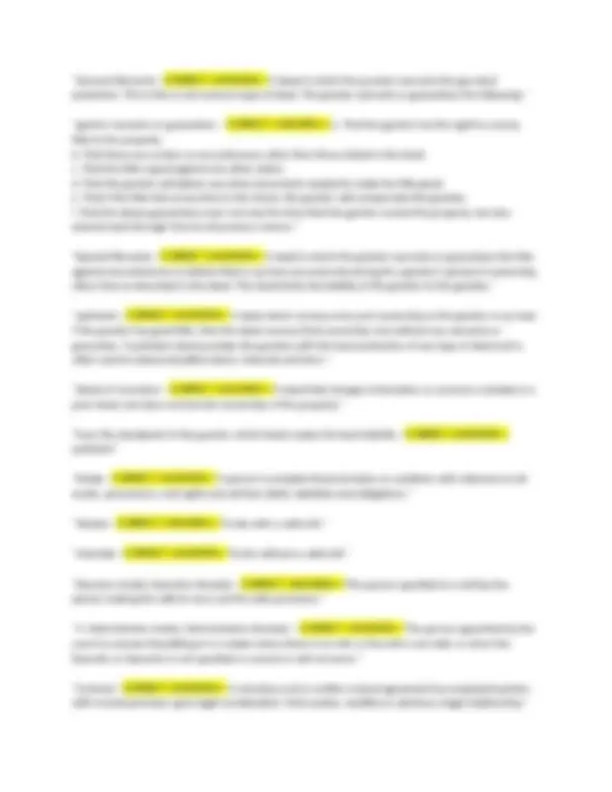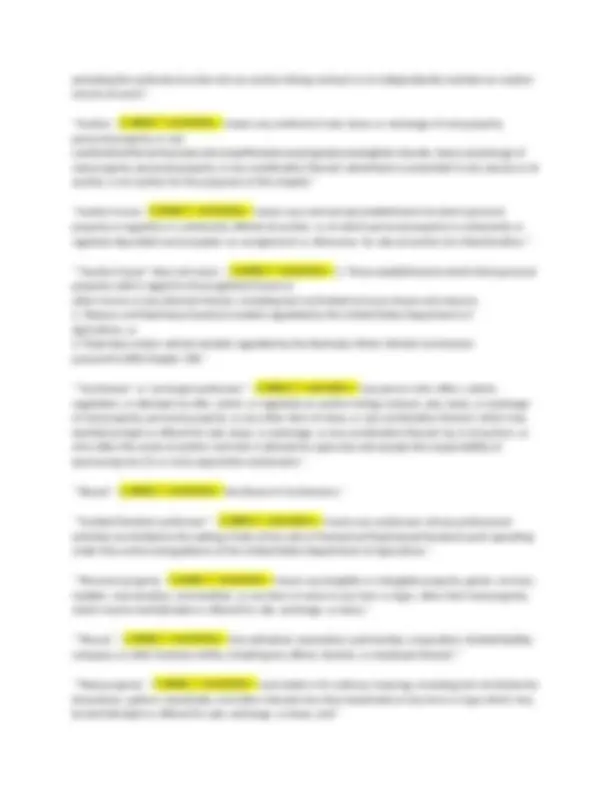








Study with the several resources on Docsity

Earn points by helping other students or get them with a premium plan


Prepare for your exams
Study with the several resources on Docsity

Earn points to download
Earn points by helping other students or get them with a premium plan
Community
Ask the community for help and clear up your study doubts
Discover the best universities in your country according to Docsity users
Free resources
Download our free guides on studying techniques, anxiety management strategies, and thesis advice from Docsity tutors
“Absolute Auction - CORRECT ANSWER=> After the auctioneer calls for bids on an article or lot, that article or lot cannot be withdrawn unless no bid is made within a reasonable time" "Auction with reserve - CORRECT ANSWER=> when auctioneer may withdraw the property at any time until he or she announces the completion of the sale. The potential bidders are the offerors" "Auction with reserve and the sellers reserving the right to bid - CORRECT ANSWER=> The auctioneer may withdraw the goods at any time until he announces completion of the sale - KRS 355.2-328. The goods may be put up subject to the seller's confirmation or subject to a certain reserve price - KRS 330.220(5). The seller, or someone acting on the seller's behalf, may bid, provided that full disclosure has been made that liberty for such bidding is retained. No licensee shall knowingly receive such a bid without this full disclosure - KRS 330.220(6)(c) and KRS 355.2-328(4)."
Typology: Quizzes
1 / 11

This page cannot be seen from the preview
Don't miss anything!







article or lot cannot be withdrawn unless no bid is made within a reasonable time"
until he or she announces the completion of the sale. The potential bidders are the offerors"
may withdraw the goods at any time until he announces completion of the sale - KRS 355.2-328. The goods may be put up subject to the seller's confirmation or subject to a certain reserve price - KRS 330.220(5). The seller, or someone acting on the seller's behalf, may bid, provided that full disclosure has been made that liberty for such bidding is retained. No licensee shall knowingly receive such a bid without this full disclosure - KRS 330.220(6)(c) and KRS 355.2-328(4)."
but not limited to timeshares, options, leaseholds, and other interests less than leaseholds of any form or type which may be lawfully kept or offered for sale, exchange, or lease. Real estate usually includes all improvements to the land, such as buildings, fences and fixtures. Title for real estate sold at auction passes at closing with delivery and acceptance of the deed."
complete ownership for all time and is the most common type of ownership."
ownership expires at the death of a designated person. This type of ownership is more often used in family situations where one family member retains ownership of the family property until his/her death, at which time ownership transfers to another family member. Interest in property held in a life estate may be sold, but rights to the property end at the death of the individual to whom the life estate was originally given."
property after adequate compensation for the purpose of using the land for the public good. Examples include land taken for highways, urban renewal projects, airport expansion, schools and parks, plus for the use of power companies, telephone companies, natural gas companies and railroads."
of property for a specified period. Unless a lease is released or expires, that lease remains with the property even if that property is sold. Leases for a year or more must be in writing."
property which in some manner burdens or diminishes the value of the property. Common encumbrances include the following:"
used as collateral for a debt or a legal interest created upon non-payment of a debt such as unpaid taxes or contractor's bills. Tax liens usually take priority over other liens and are paid off first when a property is sold. When property is sold, any unpaid liens are usually paid off at the time of transfer (closing). If the liens are not paid, transferred or released at the time of closing then they would remain on the property."
mortgage is a type of lien that becomes void on payment or performance according to stipulated terms. An additional mortgage on a property is called a second or junior mortgage. Usually when a property is sold, the first mortgage is paid off before the second or junior mortgage."
the use of real property. Restrictions include things such as building specifications on new homes in a subdivision or limitations as to the future use of a property."
by another. Easements are often for accesses to landlocked properties and rights of way for special purposes such as power or telephone lines. Easements usually pass with the title to a property."
the grantee, the buyer. The grantor must be legally competent to convey title to the property and if the grantor has a spouse, she/he must also sign the listing contract and the deed."
from the grantor, the seller. The grantee must be correctly identified in the deed."
interest, usually ownership, in real property. A deed must recognize that the grantor received valuable consideration for the property and describe the property such that a competent surveyor could locate the plot of the property. The deed should specify any exceptions or reservations to the deed, including encumbrances, liens, mortgages, taxes, restrictions, easements or limitations of the title. To be valid, a deed must be properly signed and delivered. While it is recommended that a deed also be recorded, it is not required."
or the auctioneer and the seller (or his/her agent) where the parties agree to the offering of certain goods at auction as set forth in the contract. All auction listing contracts are required by law to be written."
the seller and the buyer, with the auctioneer acting as the seller's agent. The majority of auction sales contracts for personal property are oral. All auction sales and purchase contracts for real property are required to be in writing."
and as such has legal force and binding effect."
as such is unenforceable."
more parties of that contract."
contract and as such would be enforced by the courts. Contracts in certain situations may be enforceable on one party but not another, such as a contract with a minor (see Legal Capacity)."
but not limited to timeshares, options, leaseholds, and other interests less than leaseholds of any form or type which may be lawfully kept or offered for sale, exchange, or lease. Real estate usually includes all improvements to the land, such as buildings, fences and fixtures. Title for real estate sold at auction passes at closing with delivery and acceptance of the deed."
chattels, merchandise, commodities, or any item of value in any form or type, other than real property, which may be lawfully kept or offered for sale, exchange, or lease. Title for personal property sold at auction usually passes when the auctioneer accepts the final bid and announces the item sold (at the "fall of the hammer")."
livestock."
customarily sold or traded in commercial markets, may or may not be chattels."
auctioneer. The consignor is usually the seller."
consignor) for sale at auction"
item which in some manner burdens or diminishes the value of that item. The most common encumbrance is a lien."
collateral for a debt. The auction house operator has a responsibility to act in good faith to determine that any and all goods consigned and sold at his/her auction house are free and clear from any and all leins and/or any other encumbrances."
Capacity/Contractual Authority b.Legal Purpose c. Offer and Acceptance d. Consideration e.Reality of Consent f.Legal Form"
age (18), mentally competent, and/or not intoxicated. If a bidder lacks legal capacity (such as a minor) then the "sales contract" could be void able and unenforceable against that bidder. As the seller's agent the auctioneer must act in the seller's best interest and at her/his discretion decide whether to accept the bid. If acting on behalf of another individual, for a corporation, partnership, entity or an estate that person must be duly authorized."
must be legal."
sell the goods at auction and the seller accepts. During bidding the auctioneer "offers" the item or goods and solicits bids. The bids are a series of offers and counter offers. When the auctioneer declares the item sold the auctioneer thereby "accepts", as the seller's agent, the last bid."
exchanged. In the auction listing contract, this is usually a commission or a fee paid by the seller to the auctioneer."
without misrepresentation, fraud, duress, menace, undue influence, or mistake. All parties to a contract must have a mutual understanding of the contract contents."
attention of the audience.
quality of your voice. Your chant should be one that can be maintained throughout a long auction, and does not strain your voice unnecessarily but remains strong and distinctive. Use vocal variety for emphasis, breathe deeply, and relax your throat so that you can project your voice rather than shout."
any special features and describe the item's condition."
It includes your poise and self-confidence as well as your ability to keep the auction properly paced neither too fast nor too slow for the audience to follow. It also reflects your ability to keep track of the bidding and the bidders, the pace of the bidding, control of bidding increments and other general management tasks."
(a) Offers real or personal property or any combination thereof by or at auction; or (b) Promotes, solicits, induces, or offers to conduct an auction or to provide auction services;"
directly or indirectly, by an auctioneer to deal or engage in any activity in subsection (6) of this section,
excluding the authority to enter into an auction listing contract or to independently maintain an auction escrow account;"
personal property, or any combinationthereof,bymeansofcompetitivelyincreasingordecreasingbids.Anysale, lease,orexchange of real property, personal property, or any combination thereof, advertised or presented in any way by or at auction, is an auction for the purposes of this chapter"
property is regularly or customarily offered at auction, or at which personal property is customarily or regularly deposited and accepted, on consignment or otherwise, for sale at auction at a fixed location;"
property sold in regard to thoroughbred horses or other horses or any interests therein, including but not limited to horse shares and seasons;
negotiates, or attempts to offer, solicit, or negotiate an auction listing contract, sale, lease, or exchange of real property, personal property, or any other item of value, or any combination thereof, which may lawfully be kept or offered for sale, lease, or exchange, or any combination thereof, by or at auction, or who offers the same at auction and who is allowed to supervise and accepts the responsibility of sponsoring one (1) or more apprentice auctioneers;"
activities are limited to the calling of bids at the sale of livestock at fixed-based livestock yards operating under the control and guidance of the United States Department of Agriculture;"
chattels, merchandise, commodities, or any item of value in any form or type, other than real property, which may be lawfully kept or offered for sale, exchange, or lease;"
company, or other business entity, including any officer, director, or employee thereof;"
timeshares, options, leaseholds, and other interests less than leaseholds of any form or type which may be lawfully kept or offered for sale, exchange, or lease; and"
activities are limited to the calling of bids at the sale of livestock at fixed-based livestock yards operating under the control and guidance of the United States Department of Agriculture;"
services, chattels, merchandise, commodities, or any item of value in any form or type, other than real property, which may be lawfully kept or offered for sale, exchange, or lease;"
liability company, or other business entity, including any officer, director, or employee thereof;"
limited to timeshares, options,leaseholds, and other interests less than leaseholds of any form or type which may be lawfully kept or offered for sale, exchange, or lease; and"
allows for any competitive increasing or decreasing of bids a"
as an auctioneer or apprentice auctioneer within the Commonwealth, or advertise or act as an auctioneer or apprentice auctioneer of real or personal property located within the Commonwealth, without a license issued by the board."
as a limited livestock auctioneer within the Commonwealth without a license issued by the board."
as an auction house operator within the Commonwealth without a license issued by the board. (a) An auction house operator shall be a licensed auctioneer or apprentice auctioneer if he or she acts as an auctioneer or apprentice auctioneer. If licensed as an auctioneer, an auction house operator license shall not be required. (b) If an auction house operator conducts and operates more than one (1) auction house, a license shall be issued for each location, and the initial and renewal fees shall be applicable."
the direction of any public authority or pursuant to any judicial order or decree, or to any sale required by law to be at auction;"
property conducted exclusively by an individual who personally owns such real or personal property and who did not acquire such real or personal property for resale."
does not apply to any other "person" as defined in KRS 330.020, nor does it apply to any officer, director, or employee thereof when engaged in any duties associated with those capacities."
livestock owned and offered at auction by 4-H Clubs or FFA Clubs or club members, or by any university operated by the Commonwealth of Kentucky;"
behalf of any political party, church, or charitable organization,corporation, or association if:"
receives no compensation and does not, by advertising or otherwise, present himself or herself as a licensed auctioneer;"
and not consigned; and 3. One hundred percent (100%) of the net proceeds of the auction are donated to the political"
net proceeds of the auction are donated to the political party, church, or charitable organization, corporation, or association; or"